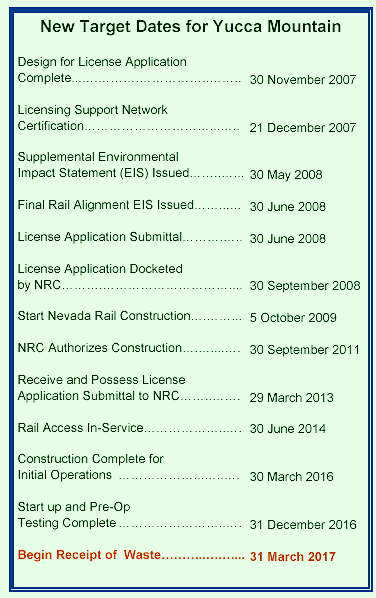
DOE Updates Yucca Mountain Project Timeline
2017 New Opening Date
The Department of Energy (DOE) has set a new target date for the opening of the proposed Yucca Mountain repository. According to a July 18 announcement, Yucca Mountain will be ready to start accepting shipments of nuclear waste in March of 2017. This is the first timeline DOE has set for the repository since it abandoned its previous deadline of 2010 two years ago.
During the early phases of the project, DOE projected that the repository would be ready to begin operations as soon as 1998. However, due to budget shortfalls and various scientific, legal, and regulatory obstacles, the repository project has fallen significantly behind that original target date. This new schedule foresees the repository opening 19 years later than planned at the outset of the project.
 Under the revised schedule, DOE expects to submit a license application to the Nuclear Regulatory Commission (NRC) by June 30, 2008. The Yucca Mountain site must be granted a license by NRC before DOE can move forward with the construction and operation of the proposed facility. NRC is a federal agency that regulates all of the nation’s nuclear facilities, with the exception of the nuclear weapons complex.
Under the revised schedule, DOE expects to submit a license application to the Nuclear Regulatory Commission (NRC) by June 30, 2008. The Yucca Mountain site must be granted a license by NRC before DOE can move forward with the construction and operation of the proposed facility. NRC is a federal agency that regulates all of the nation’s nuclear facilities, with the exception of the nuclear weapons complex.
The license application was originally slated to be submitted to NRC in December of 2004. This is the third time DOE has moved back the target submission date.
One issue that must be resolved before DOE can submit the license application is the preparation and release of research documents. Under NRC rules, DOE cannot file the application until six months after it has publicly released all background documents supporting its license application. The documents must be prepared electronically and released on an internet database known as the Licensing Support Network. DOE is in the process of cataloging millions of emails and documents to be posted to the network.
Once DOE submits the license application to NRC, the commission will have three years with a possible one-year extension to review all of the material before deciding whether to grant a license for the construction and operation of a repository at Yucca Mountain. Under the new schedule, the energy department could have approval to go ahead and begin construction of the repository by 2011.
Under the new plan, construction of a rail line to transport nuclear waste through Nevada would begin in October of 2009, two years before NRC gives DOE permission to build the repository. DOE anticipates that the rail line would be in service five years later, in June of 2014.
Construction on the actual repository would be completed by March of 2016. The facility would then go through pre-operational testing and be ready to start receiving nuclear waste in March of 2017.
This new deadline depends on the successful resolution of a number of political, financial, and legal obstacles that have stymied progress on the project. For instance, the revised schedule rests partly on the assumption that Congress will appropriate an adequate level of funding to meet the project’s needs each year. DOE also assumes that NRC will complete its review of the license application within three years.
According to an energy department document, the schedule also depends on the department obtaining “all necessary authorizations and permits,” and “the absence of litigation related delays.” According to DOE spokesman Craig Stevens, “What we based our schedule on is what we at DOE have control over, and that is significant.” However, Stevens added that “there are some things that will be out of our control.”
The new schedule received a mixed reaction from lawmakers. According to Senator Pete Domenici (R-New Mexico), chairman of the Senate Energy Committee, “This is an ambitious schedule, but it’s nice to actually see a schedule.” He added, “This is the most detailed schedule on Yucca Mountain I have seen in recent memory.”
Nevada Representative Shelley Berkley (D) was critical of the new timeline, calling it “overly optimistic.” According to Berkley, this new schedule “could easily be derailed by a court ruling or act of Congress.” Edward F. “Ward” Sproat, director of DOE’s Office of Civilian Radioactive Waste Management, commented to reporters following the announcement of the revised schedule. “I’m not saying it can’t be done, but it’s going to be a challenge,” he said. Sproat added that the department would not be able to meet the new deadline unless Congress passes a series of legislative reforms for the program contained in the “Nuclear Fuel Management and Disposal Act,” which is currently under debate in the Senate.
YuccaMountain.org
|

